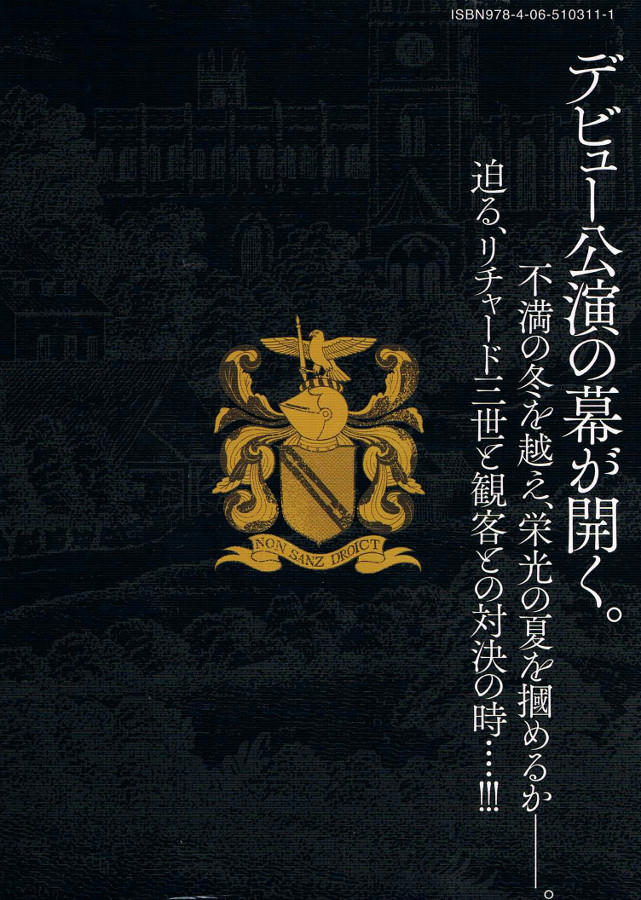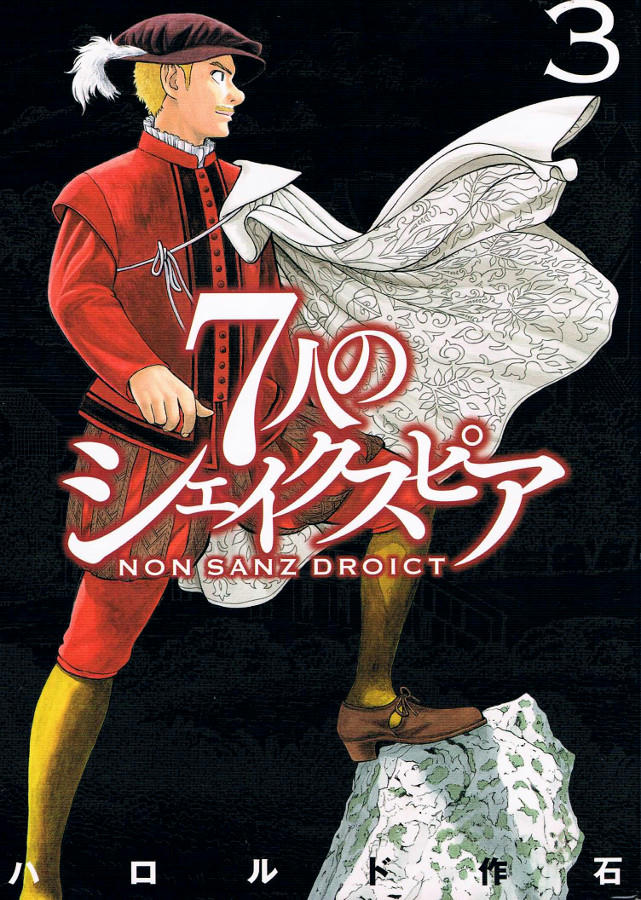(All rights belong to their owners. Images used here for review purposes only.)
The 7 Shakespeares, Non Sanz Droict, vol. 3, by Harold Sakuishi, Grade: B
Lance Carter has taken to calling himself William Shakespeare again, while everyone else calls him "Shake." The household currently consists of Will, business partner Hughes Worth, Catholic priest-in-hiding Milo (Milu or Miru), the Chinese prophetess Li, the abused wife Ann, and Ann's son Cain. Will is thinking about inviting the bookseller Thomas Soap to the house for dinner some night, and the plan (to protect the Catholics, Chinese fugitives and runaway spouses) is for Ann to continue to pose as Will's wife with Cain as their son, Milo would be the housekeeper, Hughes would be a live-in friend, and Li would be kept hidden out of sight in a room somewhere. At the moment, though, the group is waiting on Li to write another "big speech" to act as the centerpiece to hang the rest of Will's new play on, and she's uninspired. One day, Will brings home some more cheese scones from town, and Milo and Ann forbid her from touching them until she starts carrying her own weight again. This is enough to prod her to write the entire "Now is the winter of our discontent" speech in one sitting.
Will then begins writing "Richard III", to be staged in Burbage's Cross Keys theater, with the role of King Richard to be portrayed by Burbage's son, Richard. In order to get financing, Will decides to approach Ferdinando Stanley, 5th Earl of Derby one more time for backing. Ferdinando liked The Merchant of Venice, but it's Alice that really thinks that Will is fundamentally different from other playwrights (she also flirts with him, kind of blatantly).
From here, Will recruits Richard Burbage to play Richard III, and the boy pretty much develops the character of king as a blackhearted hunchback from a single reading of the play. Burbage Senior decides to stage the play in three weeks, so Will and the actors scramble to get ready in time. There's great word of mouth, but on the day of the premiere they only have half the crowd Burbage had predicted (blamed on the bad weather). Richard Burbage plays the King with abandon, scaring off half the audience. Many of the remaining audience members get bored from all the talky scenes and the long run time. Near the end, there are only a few people still in the theater watching, and they get violent, demanding that Richard act all the way to the finish so they know how the story ends. Burbage Senior decides to cut his contract with Will after the next show to avoid losing any more money. Richard Burbage knows that Will has created something great and eagerly awaits the guy's next play. Ferdinando and Alice feel the same way. Will decides that his next play will be Richard II. In the meantime, Burbage is preparing for the final presentation of Richard III, and his stage director has cut the ghost scene because there's no good way to stage it. The director accuses Will of never actually having stood on stage and thought about what the audience sees, and Will gets angry with himself for having missed the obvious. He kicks a box of props and messes up his leg in return.
Stanley and Alice think that Will has promise, but that the world isn't ready for his type of historical plays. They suggest that he shelve Richard II for the moment and work on something else. Cain agrees, demanding something with more fighting and fewer words and love scenes. Will goes along with them and announces that the next play will be about the war between the houses of York and Lancaster (implying that this may be Henry VI, part 2). This will be a challenge, because Marlowe's best historical play at that point is his new historical, Tamburlaine. (1587 or 1588). At about this time, Will is invited to Stanley's estate, and he runs into Marlowe himself. During a bit of verbal jousting, Will drops his current script, and as he picks it up from the floor, Marlowe thinks he remembers having met Will before (from having rejected Will's play on first arriving in England). Will says they've never seen each other before. They part, and Will worries that Marlowe may report Stanley as a Catholic sympathizer to the Church of England. Stanley knows the risks, but it would be more dangerous to refuse to allow Protestants onto his estate, which would be a red flag.
As all of this is going on, a young blackhaired boy is so excited at seeing Richard Burbage portraying King Richard III that he worms his way into the Cross Keys theater as a stagehand and bit actor. Unfortunately, he's incompetent in both roles. Will drops by the theater one day as Richard is giving a key speech in The Monks Bacon and Bankay (1589) (the only reference I can find to this is a Japanese page that says it's a comedy that mixes in black magic that had influenced Shakespeare's own writing). In this scene, there's a big metal "head of truth" that's supposed to announce England's fate. The new boy walks on stage, trips on the hem of his robe, and knocks the head off the pedestal, revealing it to be made of paper mache. The crowd bounces it around like a beach ball in a rock concert.
After the show, Richard takes Will backstage to meet the boy, Robin Williams. Robin also works with a friend to put on a small puppet theater on the streets. He's a horrible actor. Will complains about his ghost scene being cut from Richard III, and Robin uses his little puppet theater to show how that scene could easily be staged by using two extended turntables to hold the King and his rival, with the ghosts standing at the back of the stage and holding candles to indicate which one is talking at the time. Will realizes that the boy is a gifted stage director, but is more curious about the fact that Robin has jet black hair and eyes. Is he Chinese? Robin says, "No." His mother is British. She sits by the window of their house and drinks all day, waiting for her husband to come back from some remote land called "Japan" (Harold claims in his chapter notes that there are historical records of two Japanese men that had visited England in the 1500's, so this thing is conceivable). Will tells Hughes that they may just have found their next live-in guest. Hughes doesn't like either the increased burden on his wallet, or the risk of betraying Milo and Li.

Summary: There's a lot of historical speculation and dramatization going on this time, too. Ferdinando looks much more masculine that he does in the paintings of him, and the real Alice was very plain-looking. Also, I can't find anything showing that she smoked a clay pipe; in the manga, she never goes anywhere without it. The wiki article says that Ferdinando was spied on by the Jesuits, while the manga implies that Marlowe was the main threat. And of course, we have Li from China, and the Japanese-half Robin living with Will and helping him with his plays. On the other hand, the threat of persecution and death to Catholics in England at the time was real enough. The next point is on the timeline of Shakespeare's plays. According to the wiki article, William never released printed copies of the plays and there are no clear dates on when they were first written or performed. Many historians have tried to piece together a chronology. One of the first was by E.K. Chambers in 1930, as given below. Harold's version of events has The Merchant of Venice first, followed by Richard III. Not sure if the Battle between York and Lancaster is going to be renamed to Henry VI, Part 2, or not. We'll see. According to the Japanese page on Monks Bacon and Bankey, that was first staged around 1589, which gives us a kind of anchor for Harold's chronology, for what it's worth.
Henry VI, Part 2 (1590-1591)
Henry VI, Part 3 (1590-1591)
Henry VI, Part 1 (1591-1592)
Richard III (1592-1593)
The Comedy of Errors (1592-1593)
Titus Andronicus (1593-1594)
The Taming of the Shrew (1593-1594)
The Two Gentlemen of Verona (1594-1595)
Love's Labour's Lost (1594-1595)
Romeo and Juliet (1594-1595)
Richard II (1595-1596)
A Midsummer Night's Dream (1595-1596)
King John (1596-1597)
The Merchant of Venice (1596-1597)





No comments:
Post a Comment